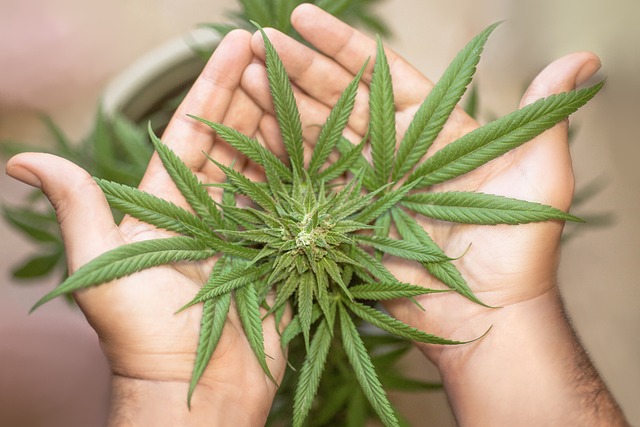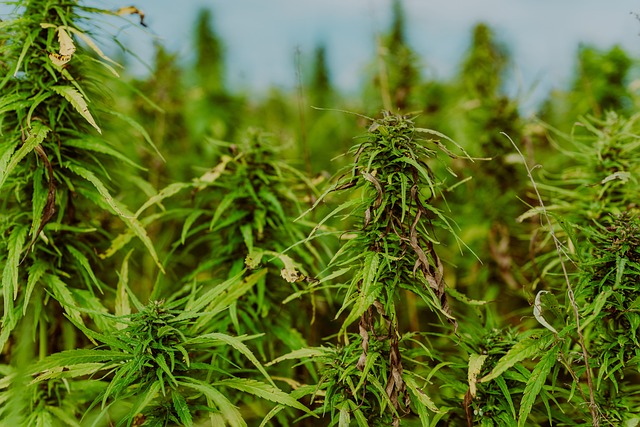THCA, or Tetrahydrocannabinolic Acid, is a non-psychoactive compound found in cannabis and hemp that has become popular in Iowa due to its potential therapeutic properties, including anti-inflammatory, analgesic, and neuroprotective effects. The 2017 Farm Bill legally distinguished hemp from marijuana, allowing hemp-derived products like THCA flower into the market in states like Iowa, provided they contain less than 0.3% THC by dry weight, as per the Iowa Industrial Hemp Act of 2018. THCA is a precursor to THC and can convert to THC when heated, offering health benefits without psychoactive effects. Research into its efficacy for various medical conditions is ongoing, with clinical trials examining its potential in managing inflammatory diseases, nausea from chemotherapy, and neurological disorders like multiple sclerosis. Users in Iowa are exploring THCA's wellness benefits, but it's crucial to stay updated on the legal landscape and consult healthcare professionals for safe and effective usage. The future of THCA in Iowa hinges on continued research and policy decisions that will further clarify its medical significance.
exploration into the therapeutic properties of THCA flower has sparked widespread interest, particularly in states like Iowa where its legal status is being redefined. This article delves into the multifaceted nature of THCA, from its burgeoning popularity and legal classification to the nuances of its chemical composition and the medical community’s findings. As we navigate through the implications for users, safety considerations, and common side effects, we aim to provide a comprehensive understanding of THCA flower within the context of Iowa’s evolving legal landscape. Join us as we explore the potential benefits, side effects, and the critical role of terpenes, cultivation practices, and user experiences that shape the landscape of THCA in Iowa today.
- THCA Flower: An Overview of Its Rising Popularity and Legal Status in Iowa
- Understanding THCA: Potential Effects and Benefits
- The Chemical Composition of THCA and Its Implications for Users
- THCA Flower: Medical Applications and Research Findings
THCA Flower: An Overview of Its Rising Popularity and Legal Status in Iowa

THCA, or Tetrahydrocannabinolic Acid, is gaining attention for its potential wellness benefits and as a precursor to THC, the psychoactive component of cannabis. As interest in cannabis derivatives grows, THCA flower, which contains the acidic form of THC, has emerged as a popular choice among consumers, particularly those seeking the therapeutic properties of cannabinoids without strong psychoactive effects. In Iowa, the legal landscape surrounding THCA products is evolving. The 2017 Farm Bill legally distinguished between hemp and marijuana, paving the way for hemp-derived products, including THCA flower, to be sold and possessed legally under federal law, provided they contain less than 0.3% THC by dry weight. Iowa followed suit with its own Industrial Hemp Act in 2018, which allows for the cultivation, possession, and sale of hemp and hemp-derived products, including THCA flower, as long as they comply with state and federal regulations. This has led to a burgeoning market for THCA products in Iowa, where consumers can legally purchase and use these items for their purported wellness benefits. However, it’s crucial for users to stay informed about the changing regulations, as laws can vary by municipality within the state and are subject to change with new legislation or legal interpretations.
Understanding THCA: Potential Effects and Benefits

Cannabidiolic acid (THCA) is a non-psychoactive compound found in cannabis and hemp plants, often converted into THC upon heating. As research continues to unfold, there’s growing interest in the potential effects and benefits of THCA, particularly within legal frameworks such as those established in Iowa. While THCA itself does not produce the psychoactive effects associated with THC, it exhibits a range of properties that users may seek for wellness purposes. Preliminary studies suggest that THCA may offer anti-inflammatory, neuroprotective, and analgesic effects, which could be beneficial for conditions like arthritis, multiple sclerosis, and neuropathic pain. Its legal status in Iowa allows for the exploration of these benefits through various forms of THCA-rich products, providing a safe avenue for individuals to explore its potential wellness applications without the high typically associated with cannabinoids. As the understanding of THCA’s mechanisms in the body deepens, so too does the interest in harnessing its advantages within therapeutic and wellness regimens. Users in Iowa interested in the potential benefits of THCA should consult with healthcare professionals to ensure safe and effective use, especially considering individual differences in response to cannabinoids.
The Chemical Composition of THCA and Its Implications for Users

Betacaryophyllene, humulene, myrcene, and caryophyllene are among the terpenes found in THCA, or tetrahydrocannabinolic acid, which is the raw, non-psychoactive form of THC found in cannabis plants. When heat is applied, THCA undergoes decarboxylation to transform into THC, the primary psychoactive compound associated with cannabis. The presence of THCA in legal cannabis products in states like Iowa, where THCA’s legal status aligns with state regulations, offers users a potential benefit by providing the precursor to THC without the immediate psychoactive effects. This allows for controlled experiences tailored to individual needs, as users can choose to activate the THC through heating methods or consume THCA directly for its reported therapeutic properties, which include anti-inflammatory and analgesic effects.
Furthermore, THCA interacts with the body’s endocannabinoid system through its affinity for both CB1 and CB2 receptors, albeit with lower efficacy compared to THC or CBD. This interaction can influence various physiological processes, including pain sensation, immune response, and mood regulation. Users in Iowa who are considering the use of THCA-rich products should be aware of these interactions and how they may affect their specific health conditions, as individual responses to cannabinoids can vary significantly. It is also important for users to consult with healthcare professionals before incorporating THCA into their wellness regimens, particularly given the evolving legal landscape and the potential side effects associated with cannabis use, such as dry mouth, red eyes, and altered mental state.
THCA Flower: Medical Applications and Research Findings

THCA, or Tetrahydrocannabinolic Acid, is a non-psychoactive cannabinoid found in the Cannabis sativa plant that has garnered attention for its potential therapeutic properties. As of the current understanding, THCA flower, which contains this cannabinoid in its raw form prior to decarboxylation (heating to transform THCA into its psychoactive counterpart THC), holds promise in medical applications. Research has indicated that THCA may exhibit anti-inflammatory, anti-nausea, and neuroprotective effects, suggesting its potential use in managing conditions such as inflammation-related diseases, nausea from chemotherapy, and neurological disorders like multiple sclerosis. Clinical trials are ongoing to further elucidate the efficacy of THCA for various medical conditions.
In states where cannabis has been legalized, including Iowa with specific laws regarding CBD and THC products, there is a growing interest in the medicinal benefits of cannabinoids like THCA. The legality of THCA flower in Iowa hinges on the specific provisions of state law, which classify certain cannabinoids as legal provided they contain no more than 0.3% THC on a dry weight basis and are sourced from hemp compliant with the 2018 Farm Bill. As such, patients and researchers in Iowa have an opportunity to explore the therapeutic potential of THCA flower within the confines of state regulations. The ongoing research into THCA’s effects is crucial for understanding its role in medicine and for guiding policymakers on its legal status.
In conclusion, the rising popularity of THCA flower in Iowa, where its legal status continues to evolve, underscores a significant shift in the state’s approach to cannabis. As explored throughout this article, THCA possesses a unique chemical composition that distinguishes it from other cannabinoids and holds potential medical applications supported by ongoing research. While the therapeutic effects and benefits of THCA are promising, users should remain informed about its side effects, which, like any substance, can vary individually. It is crucial for those considering THCA flower to navigate its legal landscape carefully, ensuring compliance with Iowa’s regulations. As the body of research expands, so too will our understanding of how this compound can be utilized for health and well-being, within the bounds of legality.
